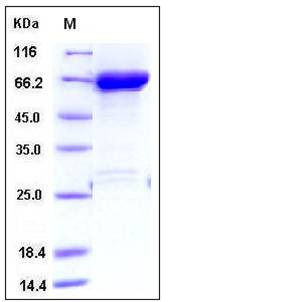Human JNK1 / MAPK8 Protein (GST Tag)
JNK,JNK-46,JNK1,JNK1A2,JNK21B1/2,PRKM8,SAPK1,SAPK1c
- 100ug (NPP4034) Please inquiry
| Catalog Number | P10795-H09B |
|---|---|
| Organism Species | Human |
| Host | Baculovirus-Insect Cells |
| Synonyms | JNK,JNK-46,JNK1,JNK1A2,JNK21B1/2,PRKM8,SAPK1,SAPK1c |
| Molecular Weight | The recombinant human MAPK8/GST chimera consists of 652 amino acids and predicts a molecular mass of 75 kDa. It migrates as an approximately 65 kDa band in SDS-PAGE under reducing conditions. |
| predicted N | Met |
| SDS-PAGE |  |
| Purity | > 90 % as determined by SDS-PAGE |
| Protein Construction | A DNA sequence encoding the full length of human MAPK8 isoform JNK1 alpha 2 (NP_620637.1) (Met 1-Arg 427) was expressed with the GST tag at the N-terminus. |
| Bio-activity | No Kinase Activity |
| Research Area | Cancer |Oncoprotein & suppressor & biomarker |Oncoprotein |Signal transducers |
| Formulation | Lyophilized from sterile 50mM Tris, 100mM NaCl, pH 8.0, 25% glycerol 1. Normally 5 % - 8 % trehalose, mannitol and 0.01% Tween80 are added as protectants before lyophilization. Specific concentrations are included in the hardcopy of COA. |
| Background | Mitogen-activated protein kinase 8 (MAPK8), also known as JNK1, is a member of the MAP kinase family. MAP kinases act as an integration point for multiple biochemical signals, and are involved in a wide variety of cellular processes such as proliferation, differentiation, transcription regulation and development. The protein kinases JNK1 has been found to serve as critical molecular links between obesity, metabolic inflammation, and disorders of glucose homeostasis. It is critically involved in the promotion of diet-induced obesity, metabolic inflammation and beta-cell dysfunction. The selective deficiency of JNK1 in the murine nervous system is sufficient to suppress diet-induced obesity. Genetic analysis indicates that the effects of JNK1 can be separated from effects of JNK1 on obesity. JNK1 is a potential pharmacological target for the development of drugs that might be useful for the treatment of metabolic syndrome, and type 2 diabetes. Furthermore, JNK1 plays a major role in the hypoxic cellular damage. JNK1 protein might be an attractive target for antihypoxic therapy in increasing resistance to many pathological conditions and diseases, leading to the oxygen deficit. |
| Reference |
